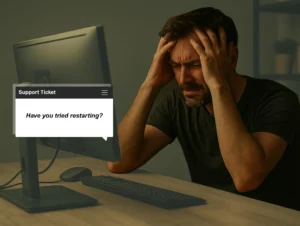I’m continually surprised at how smaller project developers fail to understand what makes a purchase valuable to a buyer. Even worse is the disingenuous way these sellers try to trick buyers into purchasing their worthless code.
In this essay, let’s tackle one of the valuation methods that sellers attempt to use to value a project that is not worth anything at all.
Let’s call it the “I spent X time, so it’s worth Y price” fallacy.
Time Invested != Value
One recurring theme I see from developers trying to sell small projects that “are ready to take off with just a little marketing” is a variation of the argument:
“I spent 600 hours building this next-gen CRM project.
At a cheap rate of $50 an hour valuation for my time, I’m selling this project for $30,000 as the minimum price.
Because that’s what it’s worth.”
No, it is not.
If the project has zero revenue, no customers, and no media buzz, it’s worth nothing. It doesn’t matter how many hours were spent coding up the project or the hourly rate, it’s still not worth a dime.
Actually, it’s worth less than nothing because it has accumulated technical debt that a new developer would have to maintain to keep the project moving forward. You’re trying to sell something that would cost a buyer money to maintain it while delivering the buyer nothing in return.
That’s not an investment and buyers should never be tricked into this line of reasoning.
What if Time Invested == Value?
Don’t believe me? Then let’s keep the thought experiment going.
What if the developer put in another 600 hours into this amazing project before selling? Heck, why not an extra 1,000 hours?
Does that double the ‘value’ of this project that makes $0 and has no customers?
Of course it does not.
If it does, why stop there, why not make it a 10,000 hour project and retire on a beach somewhere?
Or just work on the project for 10 hours and say “as you can see, with another 590 hours this is going to be worth $30,000. So I’ll just sell it to you now for a little bit less than that price.”
Or, even more intriguing, ask the seller “would you buy this for $30,000 today if I were selling it?” I’ve never tried that before, but it’d be fun to see the reaction.
“It Just Needs Some Good Marketing”
Does it now? Then wouldn’t even average marketing get the project at least a few customers? Even just one or two that would pay for what was created?
I’m amazed at the time sellers spend on Flippa arguing for this valuation model instead of taking that time to throw up a landing page, put some ad spend into Google or Facebook, and proving their product can land a few customers.
But maybe that’s a good thing for us buyers. If a seller is spending hours trying to offload a project that can’t get any customers, we don’t have to worry whether we’re passing up a good opportunity or not. We already know it’s not a good opportunity if the seller would rather spend 10 hours hawking the project to an unsuspecting buyer than spending that time on getting a customer. The seller is confirming by their actions that the product isn’t worth much at all in the first place. Much less with some good marketing.
Are All Zero Revenue Projects Worthless?
Also no.
When I bought PutsReq and PutsBox from Pablo Cantero, he never once quoted to me the hours he put into the project. These two projects were a learning and passion affair for many years for him and he likely has no idea how much time he’s spent on bringing them to life.
He never commercialized them and had no plans to do it in the near term, yet he and I both agreed that the two services contained value.
But why?
Well, it’s simple. Because they had traffic, backlinks, loyal users, and a customer base that trusted his solutions worked and would be available for free in the future. Those variables have value. It’s not the time he put into the project, but the output that came from that time.
Because Pablo is public with his work on Github, one could easily see that he wasn’t selling a pile of spaghetti code. His price was fair based on the business the two projects could generate for my complimentary products. His products and mine likely shared many of the same customers and that had value for me.
He sold his projects for a sum that did not in any way represent the time and effort he’d put into the project. Yet, it was a fair and equitable exchange and everyone on the transaction walked away happy.
Those two projects demonstrated value because they were more than hours put into writing code. If your code can’t validate the reason for its existence, it’s not worth the disk space it’s sitting on.
Pablo knew how to sell small software projects that don’t make money. Any developer that quotes you the time they’ve spent on the project likely does not.
Hours && Results > Hours && Code
Hours && Results > Hours && Code
Results > Code
Don’t ever let a developer tell you the price is worth the time they put into the project, that is not how valuations work on the small or large scale.
If the project has some cash flow and customers, then that’s what the value is based upon. But if it doesn’t, then you might be able to justify a price by demonstrating non-monetary value like Pablo’s projects. But if hours worked is your currency, it’s very hard to make a convincing argument that hours worked equals any real value.
If that were true, I’ve got a mountain of bad code to sell you that earns nothing, costs $40 month to host, but can be had for the low, low price of $150,000 any day.




